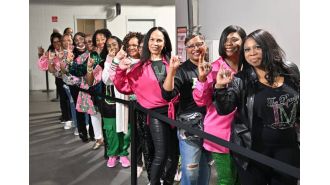Some Thoughts On Workplace Diversity
Intel made news yesterday when they announced a $300mm fund to “to be used in the next three years to improve the diversity of the company’s work force, attract more women and minorities to the technology field and make the industry more hospitable to them once they get there. The money will be used to fund engineering scholarships and to support historically black colleges and universities.”
The diversity reports coming out of the big tech companies in the past year have shown very little inclusion of african american, latino, and other “underrepresented minorities” in the tech sector’s workforce. And we all know that women are very much unrepresented in the tech sector, particularly at the top levels of leadership.
There are many, including plenty of AVC community members, who will say “so what?”. And there are many who will debate the reasons for this. I don’t think either of these things are particularly debatable. Diversity is a good thing for many reasons. It opens up a company to a multiplicity of ideas, opinions, and connections to the market. And the reasons for this lack of diversity stem from two primary (and related and self reinforcing) things, not enough women and underrepresented minorities setting themselves early enough on a career path in tech and societal biases against tech as a “proper career” for women and underrepresented minorities. These two issues have to be tackled head on and in parallel.
I applaud Intel’s move and the leadership they are showing. I have no doubt that the other big tech companies will follow their leadership in some way.
I have been working on this problem for about five years now, mostly in NYC, and in partnership with many people and many efforts that are doing great work. There are too many to list in this post. There is no shortage of effort and impact. We just need more of it.
If I have one learning and one piece of advice for the big tech companies who are likely going to start making big investments here, it would be to start as young as you can and invest all the way up from there. What I mean by that is look at early childhood education, look at elementary school, look at middle school (this is really important), and look at high school.
While Harvey Mudd has been able to achieve gender balance in its undergraduate computer science program, I think its a big ask of higher education to solve this problem all by themselves. Too many women and underepresented minorities have made decisions that take them off the pathway to a technical career long before they get to college.
I believe the biggest impact we can make is in our K-12 system, where kids first find their passions, figure out what they are good at, and start learning the skills that will set them on their way. We need to invest in STEM (or STEAM) programs that work in the K-12 system, we need to overinvest in targeting them at young women and underrepresented minorities, and we need to sustain these efforts from elementary school, through middle school, into high school, and we need to guide these young people to a pathway that can give them challenging work and a good income throughout their careers.
The guide part is important. I’ve met a ton of guidance counselors and parents who don’t think “this is the right path” for someone, when it clearly is. That’s part of the societal bias at work. I don’t think we can change the societal biases without creating role models and we can’t create role models without opening up opportunities more broadly for the underrepresented. That is why we have to attack these two issues in parallel.
I will end with the observation that there are many terrific people and organizations working on these problems and having a big impact but in a few small pockets. We need to invest in them and help them scale. This problem is being solved already and the strategies and tactics are fairly well known and validated. We don’t need to invent new things for the most part. We just need to find, fund, and support.
If anyone out there wants to get involved in doing that, you can reach out to me and I will point you in the right directions.






